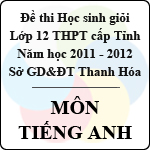Đề thi học sinh giỏi lớp 12 THPT tỉnh Thanh Hóa năm học 2011 – 2012 môn Tiếng Anh (Có đáp án), Đề thi học sinh giỏi lớp 12 THPT tỉnh Thanh Hóa năm học 2011 – 2012
SỞ GIÁO DỤC VÀ ĐÀO TẠO
|
KỲTHI CHỌN HỌC SINH GIỎI LỚP 12 THPT
|
MÔN THI: HÓA HỌC
Thời gian làm bài: 180 phút (không kể thời gian giao đề)
——————————————————————————–
Part A: PHONETICS (10pts)
I. Choose the word whose underlined part is pronounced differently from the rest in the same line. (5pts)
1. A. eradicate B. astronaut C. standard D. fatal
2. A. straight B. pleasure C. celebrate D. break
3. A. impressed B. proposed C. increased D. passed
4. A. penalize B. penetrate C. penalty D. penny
5. A. crossbar B. discuss C. association D. possession
II. Pick out the word whose main stressed syllable is different from the rest in the same line. (5pts)
1. A. optimistic B. unexpected C. environment D. electricity
2. A. contribute B. confident C. eternal D. eradicate
3. A. regulator B. adventurous C. participant D. performance
4. A. compete B. punish C. eject D. commit
5. A. administrative B. productivity C. agricultural D. economic
Part B: VOCABULARY AND GRAMMAR (40 pts)
I. Choose the most suitable word or phrase to complete each sentence. (10pts)
1. Jack takes great pride …….. never throwing anything ……… He always says that one day he’ll find a use for things.
A. on – out B. of – away C. in – away D. at – off
2. Domestic chores are now no longer a ……… thanks to the inventions of electric devices .
A. bound B. weight C. burden D. load
3. She has been working too much recently, I think ………. she should do now is to take a few days’ rest.
A. which B. thing C. what D. anything
4. They took ………….. his driving license because he was caught drunk while driving.
A. back B. off C. away D. over
5. Defensive players are not allowed to interfere ………. an opponent’s movements unless the player is holding the ball.
A. to B. in C. at D. with
6. The two computers for sale were in poor condition, so I didn’t buy ………..
A. either of them B. none of them
C. neither of them D. both of them
7. ……… daily promotes physical as well as emotional well – being in people of all ages.
A. Having exercised B. Those who exercise
C. Exercising D. For exercising
8. Peter : “ I thought your game was much better last night.”
Dave : “ You’ve got to be kidding! ……….”
A. I myself liked it very much B. I thought it was terrible
C. I’m sure you enjoyed it D. I supposed it was not bad
9. The architect ………. Mario works is brilliant .
A. whom B. that C. with whom D. with who
10. Every year ……… swimmers attempt to swim across ……….. English Chanel.
A. ─ / ─ B. ─ / the C. the / the D. ─ / an
II. Put each verb in brackets into an appropriate form. (10pts)
1. We would like (invite) ……. to the president’s reception, but we weren’t.
2. Did you know that Oscar Wilde (live) ………. in Paris during his final years?
3. There was no sign indicating that the cottage (break) ………. into.
4. Without their valuable assistance we (never, gather) ……….. enough money for our son’s operation.
5. Her head felt as if it (burst) ………. .
6. By the time I go to bed tonight, I (write) ………. more than ten pages of the novel.
7. Sam (not receive) …….. the parcel the last time I (speak) ……… to him.
8. I (consider) ………… buying a house but now I (change) ………. my mind.
III. Put each word in brackets into an appropriate form. (10pts)
Interviews are a/an (1. perfect) ……………… method of choosing the best people for jobs, yet human (2. be) ……….. like to examine each other in this way. One of the many problems of selection as it is commonly practised is that the forms filled by (3. apply) ……………… often fail to show people as they really are. This means that you can follow all the best (4. advise) ………….. when completing your form and still find that you are (5. succeed) …………… at the next stage – the interview. (6. Similar) ……….. , in the rare cases where interviews are automatic, a candidate with an (7. adequacy) …………….. form may do (8. surprise) …………. well. Your form needs to show that you have (9. confide) ………….. in your ability to do the job, but don’t try to turn yourself into someone else – a person you have to pretend to be at the interview. (10. Real) ………… and honesty are definitely the best approach.
IV. There are 10 mistakes in the passage. Find out and correct them. (10pts)
Swimming
Swimming is a very popular sporting activity so that many people have taken up in order for to keep fit or relax. Some even take part in competitions. Swimming may look like simple, however it requires a great deal of practice. There are a number of different strokes which can to be used while swimming and most people have their own special preference. The most common stroke is the “ crawl”.
Actually, the crawl wasn’t being developed until the early nineteenth century. It’s probably the most easiest stroke. Another one stroke is the back – stroke, which is used in competition or simply for relaxing. Then there is the butterfly – stroke, which is quite difficult and used mostly in competition. It resembles the up – and – down movements of a dolphin. All this, of course, it doesn’t mean that it is a sport for the young only. The elderly and disabled can benefit greatly from swimming. This is because of minimal strain is put on the limbs and back while are exercising the heart and lungs at the same time.
Part C: READING (30 pts)
I. Read the following passage and then choose the most suitable word or phrase for each space. (10 pts)
Vietnamese generally shake hands when getting and parting. Using both hands shows respect as does a (1)……. bow of the head. In rural areas, elderly people who do not extend their hand are greeted with a bow. Women are more (2) ……. to bow the head than to shake hands. Vietnamese names begin with the family name and are (3) ……… by a given name. People address (4) ………. by their given names, but add a title that indicates their received (5) …….. to the other person. These titles are family related rather than professional. Among colleagues, for example, the (6) ……… of the two might combine the given name with the title of “Anh” ( Older Brother ). A/n (7) ………. greeting combined with the given name and title “Xin chao” (Hello). Classifiers for gender and familiarity are also combined with the greeting. In formal meetings, business cards are sometimes (8) ………. on greeting.
Vietnamese people have a strong (9) ……… of hospitality and feel embarrassed if they cannot show their guests full respect by preparing for their arrival. Therefore, it is (10) ….. to visit someone without having been invited. Gifts are not required, but are appreciated. Flowers, incense, or tea may be proper gifts for the hosts. Hosts also appreciate a small gift for their children or elderly parents.
1. A. light B. slight C. lightly D. lighted
2. A. certainly B. possibly C. mainly D. likely
3. A. continued B. chased C. followed D. forwarded
4. A. each one B. one other C. the other one D. one another
5. A. relation B. relationship C. relations D. relatives
6. A. younger B. most young C. youngest D. young
7. A. easy B. basic C. fundamental D. elementary
8. A. changed B. transferred C. converted D. exchanged
9. A. sense B. sensation C. sensitivity D. sensibility
10. A. inactive B. inaccurate C. inappropriate D. inexact
II. Supply the most suitable word for each blank. (10 pts)
After school many British students go to university. They (1) …….. to several universities through UCAS (Universities and Colleges Admission Service) and receive (2) …….. of a place on condition that they achieve certain (3) …….. in their A levels.
A first degree, which is usually an honors degree, generally takes three years. Most courses end with (4) ……. called finals. Results are given as classes (= grades): a first is the highest class, seconds are often split between upper second and lower second, and below that is a third. (5) …….. may add the letters BA (Bachelor of Arts) or BS (Bachelor of Science) after their name. Some graduates go on to study for a (6) …….… degree, often a master’s degree or a doctorate.
Students in Britain formally had their tuition (7) ………. paid by the state and received a government (8) ………. to help pay their living expenses. Now they receive only a loan towards their expenses, and have to (9) …….. £ 1000 a year toward tuitions. The new arrangements have caused a great deal of concern both among students and among members of the public who believe that education should be (10) ………….
III. Read the passage and choose the best answers to questions below. (10 pts)
Before the mid-nineteenth century, people in the United States ate most foods only in season. Drying, smoking, and salting could preserve meat for a short time, but the availability of fresh meat, like that of fresh milk, was very limited, there was no way to prevent spoilage. But in 1810 a French inventor named Nicolas Appert developed the cooking-and-sealing process of canning. And in the 1850’s an American named Gail Borden developed a means of condensing and preserving milk. Canned goods and condensed milk became more common during the 1860’s, but supplies remained low because cans had to be made by hand. By 1880, however, inventors had fashioned stamping and soldering machines that mass-produced cans from tinplate. Suddenly all kinds of food could be preserved and bought at all time of the year.
Other trends and inventions had also helped make it possible for Americans to vary their daily diet. Growing urban population created demand that encouraged fruit and vegetable farmers to raise more produce. Railroad refrigerator cars enabled growers and meat packers to ship perishables great distance and to preserve them for longer periods. Thus, by the 1890’s, northern city dwellers could enjoy southern and western strawberries, grapes, and tomatoes, previously available for a month at most, for up to six months of the year. In addition, increased use of iceboxes enabled families to store perishables. An easy means of producing ice commercially had been invented in the 1870’s, and by 1900 the nation had more than two thousand commercial ice plants, most of which made home deliveries. The icebox became a fixture in most homes and remained so until the mechanized refrigerator replaced it in the 1920’s and 1930’s.
Almost everyone now had a more diversified diet. Some people continued to eat mainly foods that were heavy in starches or carbohydrates, and not everyone could afford meat. Nevertheless, many families could take advantage of previously unavailable fruits, vegetables, and dairy products to achieve more varied fare.
1. What does the passage mainly discuss?
A. Causes of food spoilage
B. Commercial production of ice
C. Inventions that led to changes in the American diet
D. Population movements in the nineteenth century
2. The word “prevent” in line 4 is closest in meaning to
A. estimate B. avoid C. correct D. confine
3. During the 1860’s, canned food products were
A. unavailable in rural areas
B. shipped in refrigerator cars
C. available in limited quantities
D. a staple part of the American diet
4. It can be inferred that railroad refrigerator cars came into use
A. before 1860 B. before 1890 C. after 1900 D. after 1920
5. The word “them” in line 15 refers to
A. refrigerator cars B. perishables C. growers D. distances
6. The word “fixture” in line 22 is closest in meaning to
A. luxury item B. substance
C. commonplace object D. mechanical device
7. The author implies that in the 1920’s and 1930’s home deliveries of ice
A. decreased in number
B. were on an irregular schedule
C. increased in cost
D. occurred only in the summer
8. Which of the following types of food preservation was NOT mentioned in the passage?
A. Drying B. Canning C. Cold storage D. Chemical additives
9. Which of the following statements is supported by the passage?
A. Tin cans and iceboxes helped to make many foods more widely available
B. Commercial ice factories were developed by railroad owners
C. Most farmers in the United States raised only fruits and vegetables
D. People who lived in cities demanded home delivery of foods
10. The word “fare” in line 27 is closest in meaning to
A. starches B. carbohydrates C. diet D. meat
Download tài liệu để xem thêm chi tiết










